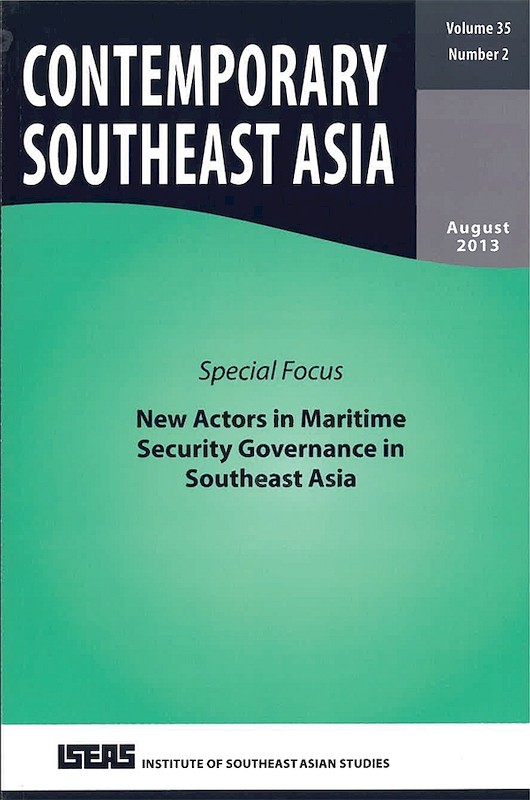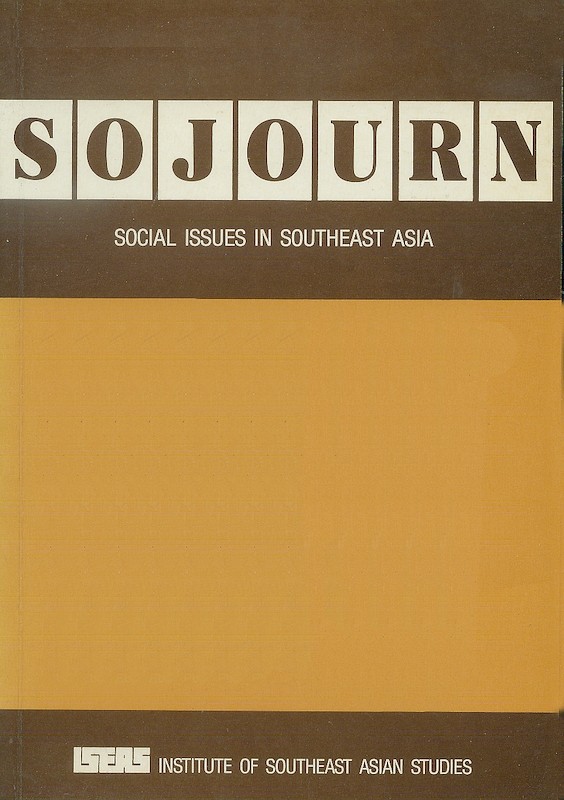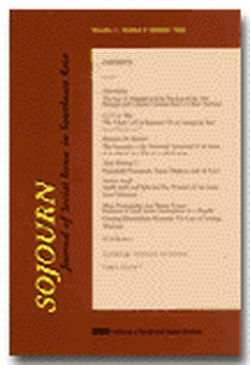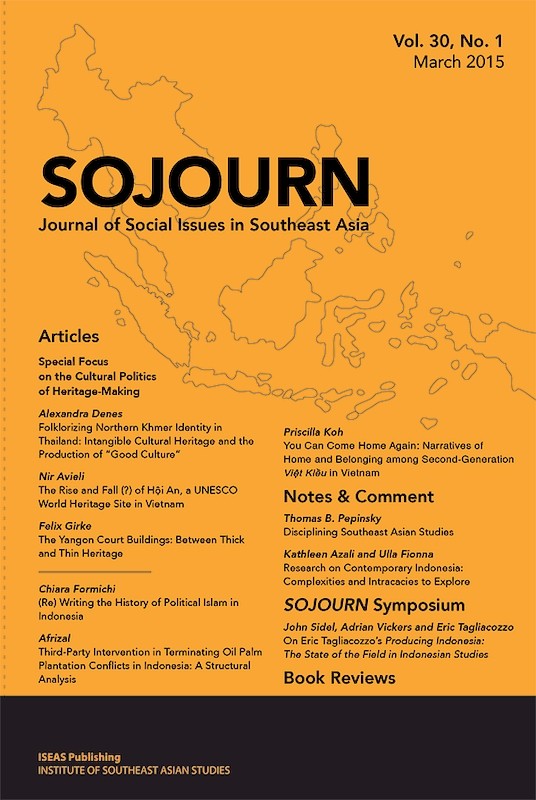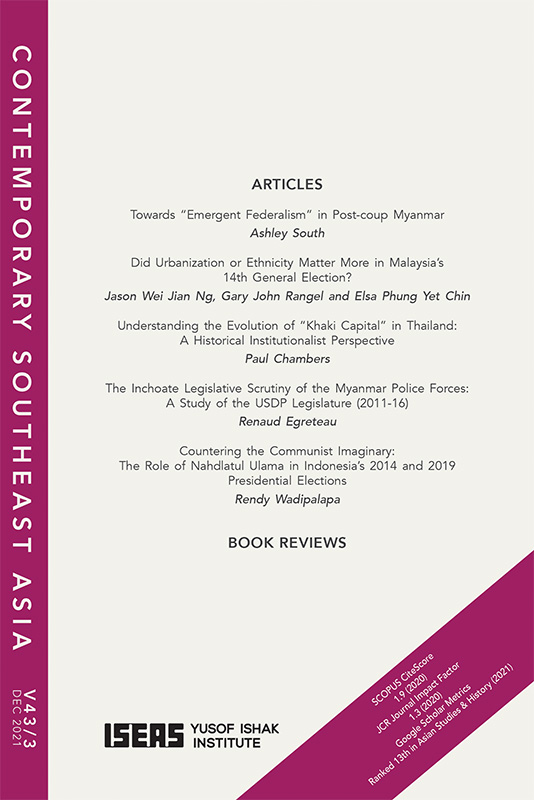SOJOURN: Journal of Social Issues in Southeast Asia Vol. 30/2 (July 2015)
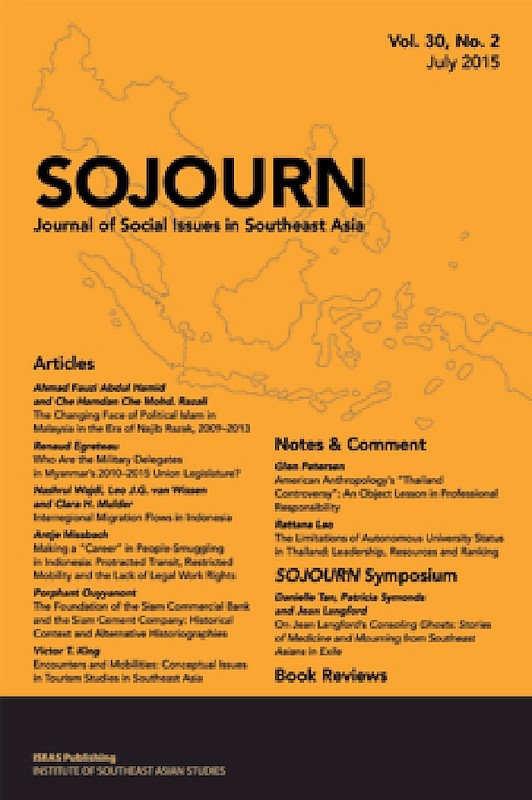
Date of publication:
July 2015
Publisher:
Institute of Southeast Asian Studies
Number of pages:
307
Code:
SJ30/2
Contents
-
SOJOURN: Journal of Social Issues in Southeast Asia Vol. 30/2 (July 2015)
[Whole Publication, ISSN: 17932858] -
Preliminary pages
- ARTICLES
-
The Changing Face of Political Islam in Malaysia in the Era of Najib Razak, 2009-2013 , by Ahmad Fauzi Abdul Hamid, Che Hamdan Che Mohd Razali, authors see abstractNajib Razak’s tenure as Malaysia’s sixth prime minister has witnessed vigorous drives towards multiple visions of political Islam, orchestrated by different sets of Islamists in both overtly political groups and nonstate activist clusters. While Islam has always been a pivotal factor in Malaysian politics, interpretations of Islam, concerning both doctrine and practice, have arisen among successive generations of Malaysian Muslims. Since the beginning of Najib Razak’s premiership, however, the initiative in defining the Islamic framework of the nation has, with ghastly consequences, been effectively delegated to the official Islamic bureaucracy, whose horizons are coloured by visions of Islamist uniformity rather than a religiously acceptable Muslim plurality. At the same time, the emergence of a range of civil-society actors has complicated the Islamist terrain. Najib faces a predicament in continuing Malaysia’s practice of pluralist politics whilst at the same<br>time accommodating inclusive notions of Islam in his management of the body politic.
-
Who Are the Military Delegates in Myanmar's 2010-2015 Union Legislature?, by Renaud Egreteau, author see abstractMade available in 2012, short biographies of 166 officers permit examination of the sociological profiles of the Burmese military officers seconded to Myanmar’s Union parliament. Data cover the five sociodemographic variables of gender, age, ethnicity, religion and education, as well as the positions that these officers occupied at the time of their secondment to parliament. These data show that, as a group, the initial cohort of military legislators constitutionally appointed to the two houses of Myanmar’s inaugural “post-junta” Union parliament had a younger and relatively better-educated profile than their elected peers. The most senior officers also had had long careers in the bureaucracy of the armed forces and in its training and educational institutions. Yet as a group they proved far less ethnically and religiously diverse than the civilian representatives, as the substantial majority of them were ethnic Bamar and Buddhist.
-
Interregional Migration Flows in Indonesia, by Nashrul Wajdi, Leo J G van Wissen, Clara H Mulder, authors see abstractPopulation Census and Intercensal Population Survey data permit description of the origin–destination patterns that characterize interregional migration flows in Indonesia. Application of the framework of population redistribution proposed by Long (1985) results in indications of over-urbanization, sub-urbanization and metropolitan-to-non-metropolitan migration. However, indications of sub-urbanization and metropolitan-to-non-metropolitan migration are weak, as migrants<br>originate in diverse areas of the country but move mostly to particular areas of Java — mainly Jakarta and its surroundings.
-
Making a "Career" in People-Smuggling in Indonesia: Protracted Transit, Restricted Mobility and the Lack of Legal Work Rights, by Antje Missbach, author see abstractTwo case studies of convicted Afghan people smugglers detail the specific tasks and responsibilities of people smugglers in Indonesia. Academic research has so far overlooked the fluctuant nature of smuggling networks, the distribution of roles and the varying involvement of their members and auxiliaries. Attention to these dimensions of people-smuggling contributes to a more nuanced understanding of the operation of these networks in the Indonesian setting. This understanding suggests that entering criminal business networks such as people-smuggling networks is the last option left for failed asylum seekers stuck in Indonesia. More significantly, it makes clear that Australian and Indonesian asylum policies and border politics have, unintentionally, contributed to the evolution of transnational people-smuggling networks.
-
The Foundation of the Siam Commercial Bank and the Siam Cement Company: Historical Context and Alternative Historiographies, by Porphant Ouyyanont, author see abstractBoth established prior to the First World War, the Siam Commercial Bank and the Siam Cement Company are two of the principal investments of the Thai Crown Property Bureau. Most accounts exaggerate the role of the Thai monarchy and elites, and underestimate the significance of the political and economic context and of the role of Europeans, especially Danes, in the formation of these companies. Emphasis on the part of Thai writers on the role of Thai elites in the history of these companies forms part of a narrative that sees the nation’s development as guided from above by a far-sighted and benign monarchy.
-
Encounters and Mobilities: Conceptual Issues in Tourism Studies in Southeast Asia, by Victor T King, author see abstractThere have been recent attempts to advance research in tourism studies and to redefine the rationale and focus of this field of study. Erik Cohen and Scott A. Cohen have published important and stimulating papers in a recent exercise aimed at rethinking the sociological and anthropological analysis of tourism. They propose a “mobilities” paradigm as a conceptual way forward. However, with reference to Southeast Asian research material the established concept of “encounter”, incorporating the notion of a field of social, cultural, symbolic and virtual interaction, continues to provide an alternative way to think about and analyse on-the-ground activities at tourism sites.
- NOTES AND COMMENT
-
American Anthropology's "Thailand Controversy": An Object Lesson in Professional Responsibility, by Glenn Petersen, author see abstractNearly half a century after it unfolded, American anthropology’s so-called “Thailand Controversy” remains a matter of contention, as controversial as ever. In his recent contribution to SOJOURN, “Phantom Scandal: On the National Uses of the ‘Thailand Controversy’ ”, Hjorleifur Jonsson (2014) argues that the episode is best understood as a witch hunt conducted by anthropologists and that it constitutes an unfortunate blight on the discipline of anthropology. I want to take issue both with significant aspects of the story as Jonsson recounts it and with some of the lessons that he draws from it. As one whose anthropological career has been profoundly shaped by my experiences in Southeast Asia and by the Thailand Controversy as it happened, my perspective on the matter differs distinctly from Jonsson’s. Moreover, the events concerned continue to inform anthropology’s ties to the military; the controversy’s relevance is of more than antiquarian interest.
-
The Limitations of Autonomous University Status in Thailand: Leadership, Resources and Ranking, by Rattana Lao, author see abstractDrawing on the author’s 22 January 2015 lecture at the conference on “Research for Social Devotion” held to commemorate the fiftieth anniversary of Khon Kaen University, this comment discusses the challenges facing Thai universities making the transition to “autonomous” status. While current policy discourse is focused on the legal and financial aspects of this transition, attention to questions of leadership, uneven resources and the obsession over international ranking is overdue. The universities must be regarded as places for higher learning. It is important to break away from the limitations of rankings and assessment to ensure the quality of a university and its mandate to develop academic freedom and excellence.
- SOJOURN SYMPOSIUM
-
Consoling Ghosts: Stories of Medicine and Mourning from Southeast Asians in Exile by Jean Langford, by Danielle Labbe, Patricia Symonds, Jean Langford, authors
- BOOK REVIEWS
-
BOOK REVIEW: Space and the Production of Cultural Difference among the Akha Prior to Globalization: Channeling the Flow of Life by Deborah Tooker, by Guido Sprenger, author
-
BOOK REVIEW: INTRACO: Blazing a Trail Overseas for Singapore? by Faizal bin Yahya, by Edmund Terence Gomez, author
-
BOOK REVIEW: Haunting Images: A Cultural Account of Selective Reproduction in Vietnam by Tine M. Gammeltoft, by Allen Tran, author
-
BOOK REVIEW: Vietnam's New Middle Classes: Gender, Career, City by Catherine Earl, by Ann Marie Leshkowich, author
-
BOOK REVIEW: Women on the Move: Hanoi's Migrant Roving Street Vendors by Rolf Jensen, Donald M. Peppard, Jr. and Vu Thi MInh Thang, by Van Nguyen-Marshall, author
-
BOOK REVIEW: Land for the People: The State and Agrarian Conflict in Indonesia edited by Anton Lucas and Carol Warren, by Lesley Potter, author
-
BOOK REVIEW: Growing Up Female in Multi-Ethnic Malaysia by Cynthia Joseph, by Sara Ashencaen Crabtree, author
-
BOOK REVIEW: Thinking Small: The United States and the Lure of Community Development by Daniel Immerwahr, by Michael J Montesano, author

